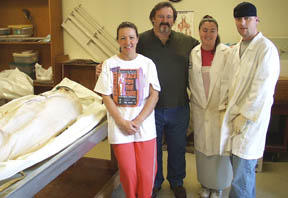Friday was definitely not a day for the squeamish at Tacoma Community College.
On that day last week, Tacoma Community College students in a cadaver dissection course demonstrated surgical procedures during the colleges Surgical Demonstrations program.
Approximately 300 people from local high schools, hospitals and colleges attended this years annual event, which was co-sponsored by the TCC biology department and the Madigan Army Surgical Department.
The annual event is a rare opportunity for students, as few community colleges use human cadavers in anatomy classes.
The use of cadavers offers students the opportunity to work on the human body, said biology department faculty member Tim Keely.
Students can explore the cadavers muscles and organs, he said. Seeing the real thing is useful, he noted, when compared to idealized models or pictures. Theyre maybe not as ordered, he explained, with regard to how organs can actually be found inside the human body.
As for comparing models and pictures to the genuine articles, he added, All I can say is its not as realistic.
At least one student in his cadaver dissection course agreed. It looks so much different fresh, said Michelle McConnell. It looks very different from the books.
The days demonstrations included procedures on the larynx and vocal cords; hand; great vessels of the heart; bladder and prostate; and ligaments of the knee.
In addition to the five surgeries on various body parts, each one held in a different room of Building 14, there were two whole cadavers – one male and one female – laid out for observation and discussion. The male cadaver was that of an individual in his early-to-mid 80s who died of pneumonia. The female cadaver was that of a 95-year-old widowed homemaker who passed away from a stroke in March 2001.
The cadavers are supplied by the University of Washington Medical School in Seattle, Keely said, adding the college used to get its cadavers from the University of Puget Sound and the Tacoma Surgical Club.
Uttering a sentence that would sound utterly macabre in almost any other setting, Keely said, We pride ourselves on having a nice collection of real body parts.
The biggest problem with cadavers, he said, was they tend to dehydrate over time. Each cadaver spends two years here, Keely pointed out.
They have to donate their body to medical research, said TCC nursing student Troy Mills, of the people whose bodies end up being used by students to practice surgical techniques.
Wearing a white lab coat and sporting his baseball cap backwards, Mills addressed those who came to see the male cadaver, explaining the process of removing the bodys skin and exposing the muscles and internal organs.
Its a fun class, you guys! he told those in attendance, a few of whom looked visibly nauseous or otherwise shaken at the sight before them: the supine, naked form of an elderly man, with various flaps of skin cut away from the body to view the muscles and organs underneath.
Small holes were visible at the end of the toes, the site of where embalming fluid was administered. With large swaths of skin cut away from the legs, exposing the darker-colored muscles below the surface, the mans intact feet resembled shoes.
You must be careful, take your time to cut the skin and look underneath, explained Mills, who along with other students, has been working on the body since April.
While some people were uncomfortable at seeing a dead body – especially one that is partly skinned with some innards exposed – Keely said it was rare for anyone taking part in or witnessing the surgical demonstrations to become ill or faint.
Basically the course is real hands-on, as you can see, said Mills, who has obviously overcome any trepidation he might have had at the prospect of working with cadavers. Its very awkward at first. But you get used to it.
Lemon wedges – to be held under ones nose – were made available for those bothered by any odors, which were surprisingly minimal. Keely credited that to a cocktail of formaldehyde, deodorants and other chemicals used to treat the bodies.
The cadaver dissection course is an elective, but is a prerequisite for those in the nursing program. TCC has been holding its annual Surgical Demonstrations event for 15 years.
Its a neat opportunity to do this, said TCC nursing student Kim Olsen, who had just witnessed a surgical procedure on a hand.





